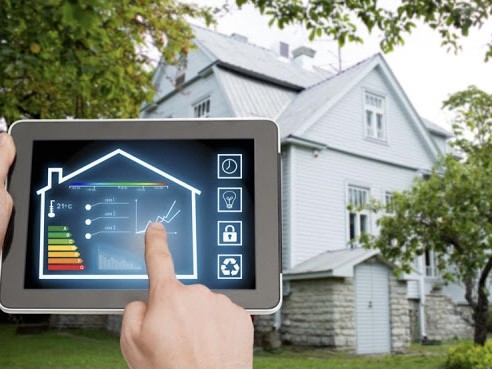In the world of advancing technology, it can be hard to decipher what will add value and assist you in your everyday life, and what technology will go unused. Smart Homes are all the craze right now, between advanced security measures, water leak signifiers, and temperature control that monitor your house. With every new invention out there, there can be both positives and negatives. Here is our compiled list of smart home pros and cons.
Smart Home Pros #1: Accessibility
The accessibility of having a smart home can be beneficial for many users, particularly the elderly and disabled. There are different ways that this accessibility can help, for instance allowing the user to operate the television, light switches, air control, and lock doors from the ease of an app. The accessibility also leads toward a new-found independence that can prove to be highly valuable to someone that is either elderly or disabled.
The accessibility of what can be done over application can benefit the caregiver as well. With access to security cameras, environmental home sensors (for fire or gas leaks) and body sensors can allow peace of mind to those who are caring for someone who is elderly or disabled with their smart home. Check out more benefits to having wellness cameras in your home.
Smart Home Pros #2: Increase Home Value
Having pre-existing smart home technology can increase your home value. One of the knocks of obtaining home security is incurring the cost of installation. However, by installing smart home technology, it is estimated that it can increase the value of your home up to 5%. Current buyers are looking for safety-enhancing gadgets such as thermostats, lighting, carbon monoxide detectors, security cameras and locks. Buyers aren’t even looking for all of those options listed, there are budget friendly choices that can make a big impact on perspective buyers.

Smart Home Pros #3: Energy Saver
Having smart home technology can help save you money on your energy bills, adding to more money saved by the end of the year. Specifically, using a smart thermostat will help you and your wallet. The thermostat will monitor what rooms are used most frequently by motion detecting, therefore focusing on what rooms to heat or cool, instead of expelling energy to keep the entire house at a certain temperature. It can also monitor your daily scheduling habits, and will work around your schedule without you having to program it daily. The thermostat companies Ecobee and Nest claim that their thermostats can help homeowners save up to 23%, or on average 10-15% on your yearly energy spending.
Smart Home Pros #4: Safety
Smart homes generally include different safety features such as security cameras, alarms, motion sensors and lights to help you understand what is happening in your home when you’re not there, or when you’re asleep. Having access to that kind of data can help you further than just catching a thief. Smart homes have the ability to lock doors if you forget, turn on lights before you get home, see who is at your doorbell and keep track of any potential carbon monoxide leaks.
Smart Home Cons #1: Money
Every piece of technology comes with a price tag, and smart homes can come with a big price tag. However, not all have to be expensive. Spending money on a smart home during the building phase is one great way to save. Costs can pile up if you have to hardwire an older home. Instead of fixing every room, homebuyers should focus on exactly what they want to achieve. Security cameras and smart doorbells are cheaper fixes than replacing every lightbulb in your home, adding dimmer switches and installing LED strips. Smart locks and security cameras aren’t as expensive as you may think, and the investment is worth it.
Smart Home Cons #2: The Learning Curve
Some homebuyers stray from creating a smart home thinking that they won’t understand how to work the technology and that they’re behind on the learning curve. However, there are technologies out there that are more inclusive for those who might be technologically behind. Everything that is new to your home will take some time to get used to, whether it’s new technology or a brand-new oven. Instead of shying away from a product because you’re afraid of not understanding the application, think about all the benefits that will come from having the technology.
Smart Home Cons #3: Internet Connection
One of the major downfalls of smart homes is that they are internet dependent. What happens if your internet goes down? If you lose the internet, you won’t necessarily lose the ability to use your smart home applications. While you might not be able to control the lights from your phone, the light switch will still work and even if you lose Wi-Fi, your thermostat will still work from the wall itself. However, if you’re paying for Wi-Fi and for your smart home technology, having it not work in its intended way can be frustrating for any buyer. Make sure to buy products that aren’t dependent on the internet and will still function properly.

Smart Home Conclusion
Between the smart home pros and cons, there are more pros than cons. At the end of the day, each household will have to make their own decisions on whether to advance their home now or wait for the newest technology that suits their family best. To learn more about what we can offer, contact us today. We’ll set you up with a knowledgeable professional who can give you the best offers and advice out there.



